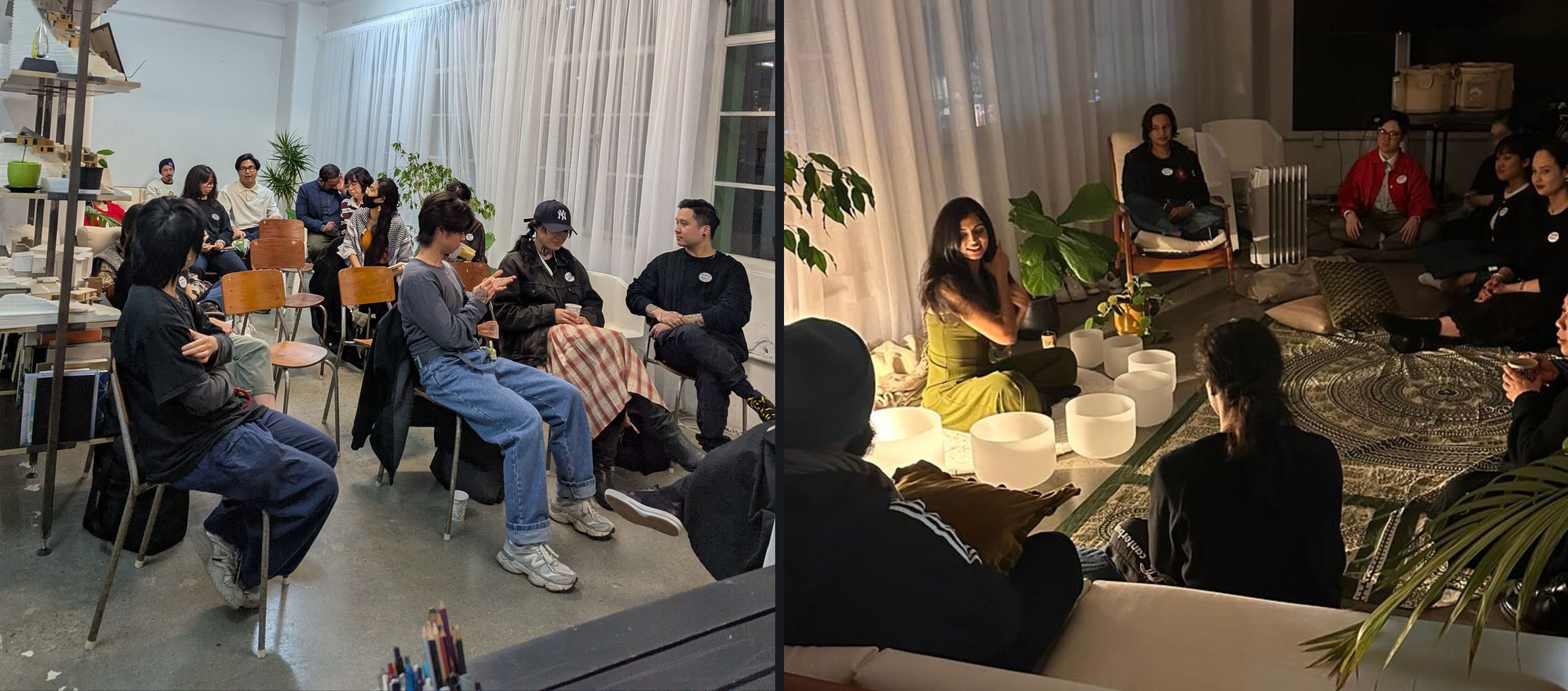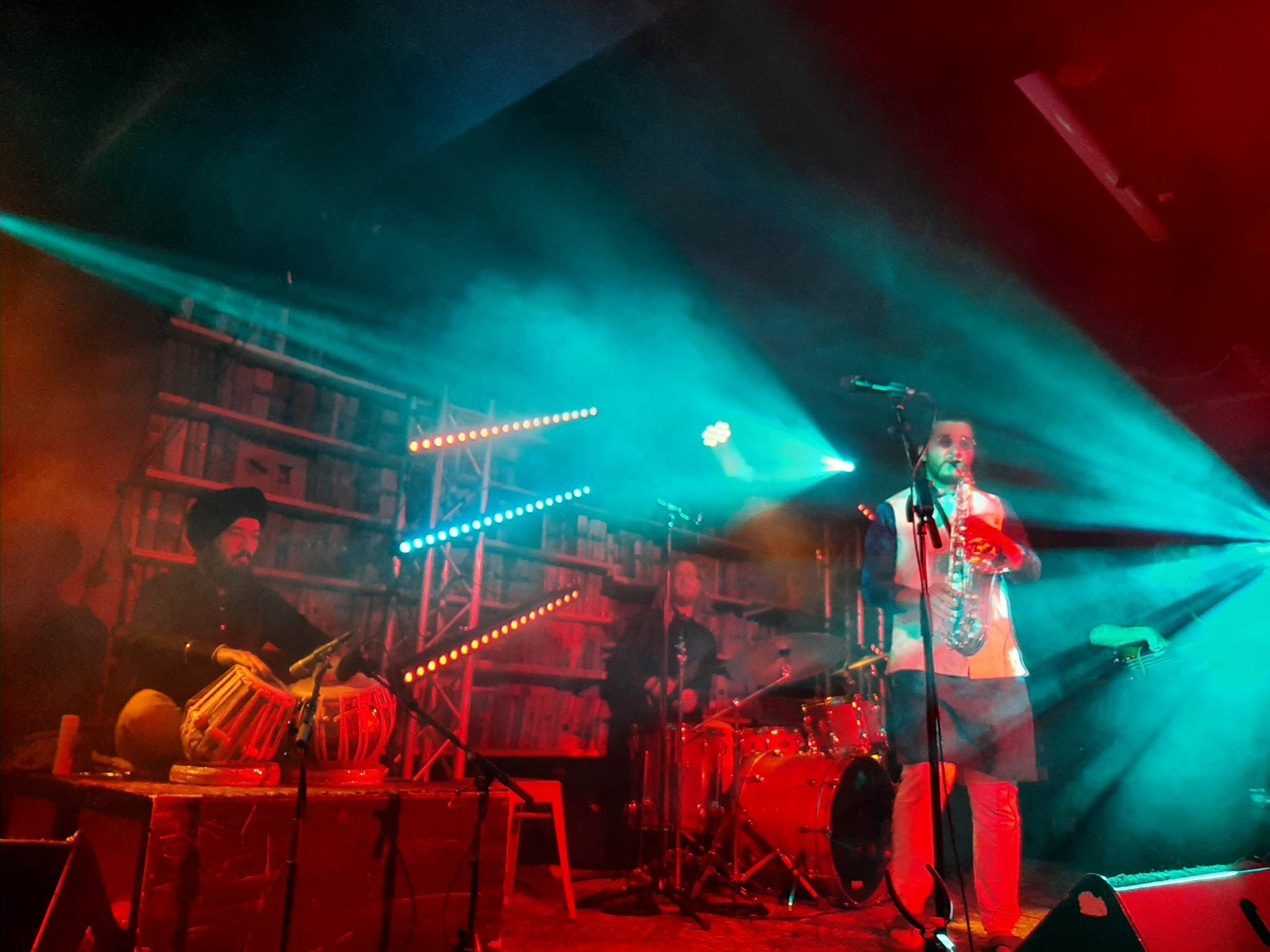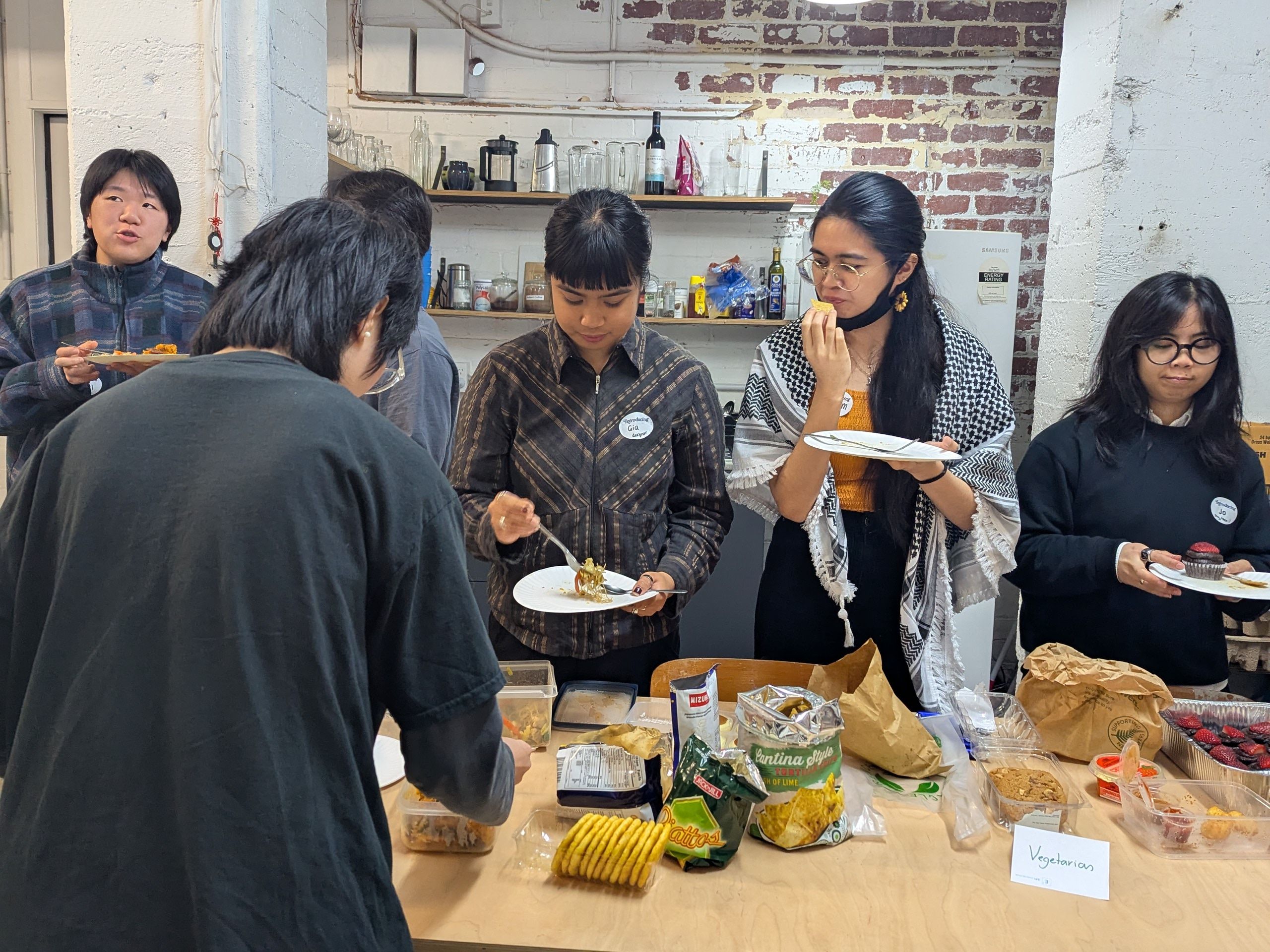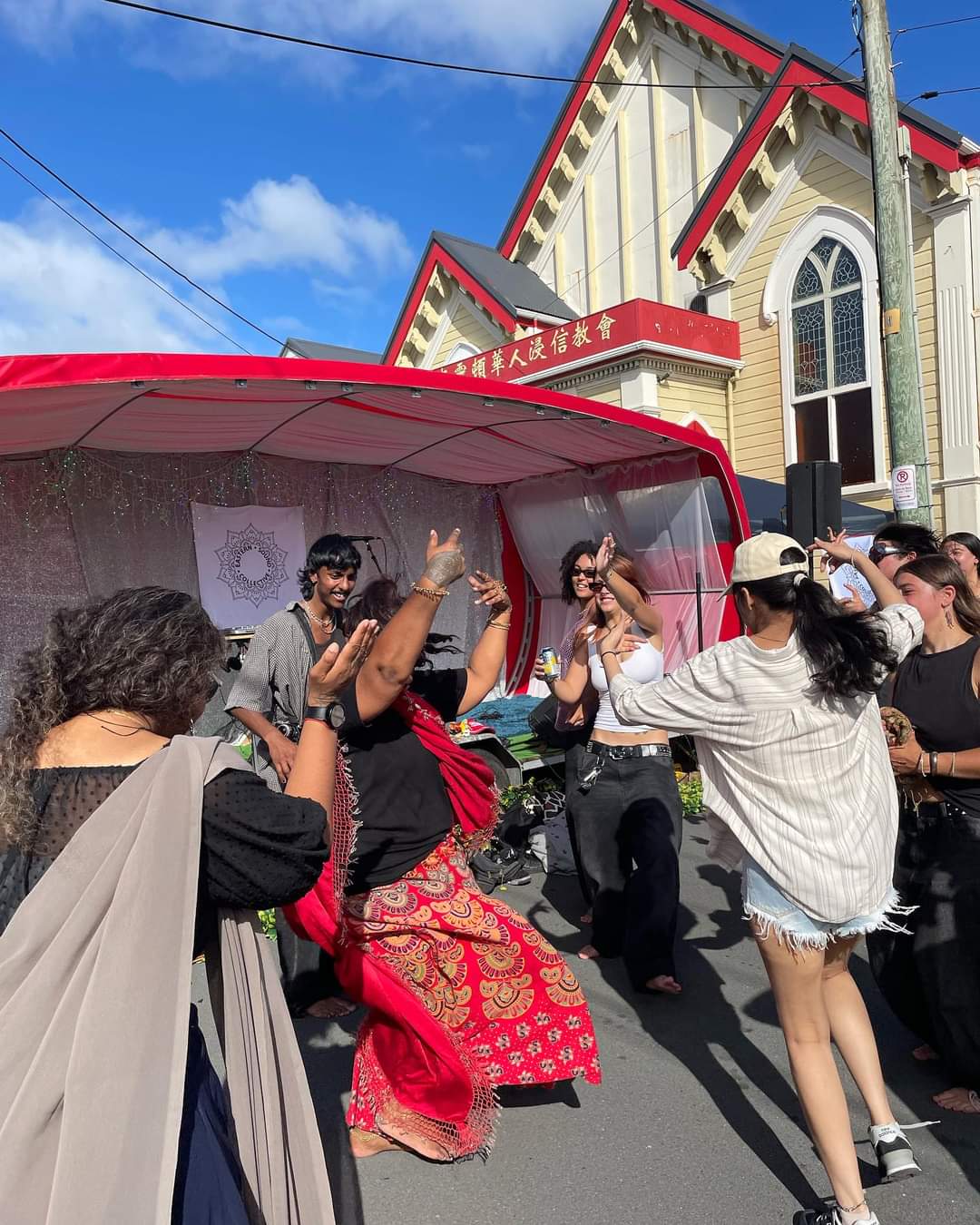Eastern Sound Collective: Amplifying Asian voices in Aotearoa's music scene in six tracks
Ahi Karunaharan speaks to the founders of a beacon for cultural representation and artistic collaboration.
In the heart of Pōneke Wellington, a remarkable movement has been quietly revolutionising New Zealand's music landscape. Eastern Sound Collective (ESC), established in 2020, embodies the growing recognition of Asian voices and serves as a beacon for cultural representation and artistic collaboration.
On a cold, rainy, and windy night in Wellington earlier this year, I headed to Dixon Street, where the collective meets every two months. I recognised the building. It was once one of the last adult cinemas in the city. I was never old enough to go into it before it closed. The space is now a spectacular open-plan office that doubles as the collective’s gathering space after hours.
The meetups are a loose structure that holds the collective together. They begin with a workshop run by one of the artists from the collective. On the evening I attended, co-founder Nadia Freeman led a vocal warm-up and a seminar on caring for your voice. This was followed by shared kai and conversation.

A few weeks later, I caught up with her and another of the founders, Arindam Sen (Aru), to hear all about Eastern Sound Collective.
Here is the story of ESC in six tracks.
Track 1: Big Bada Boom
Two decades ago, when I was a student, Wellington pulsed with breakthrough energy. It gave birth to acts like Fat Freddy's Drop, Trinity Roots, The Black Seeds, Deva Mahal, Kora, Hollie Smith, and Rhombus. For the South Asian community, there was Big Bada Boom, a collective of South Asian musicians. This was quite revolutionary at the time. Big Bada Boom paved the way for South Asian creatives across the city to perform in notable venues and festivals, as well as at regular events. The Untouchable Collective and The Sub-Continental Artist Guild followed in their footsteps, both of which I was a part of. Eventually, many of our members travelled and moved overseas, so the collectives came to an end.
Fast forward to early 2020. Nadia arrived in Wellington from the United Kingdom where she had been spoiled for choice with a burgeoning Asian music scene. She was somewhat bereft to see that there was nothing like that here for Asian musicians.
Fate would have it that Nadia would meet Karnan and Arindam Sen (Aru), who were a part of Big Bada Boom. This coming together marked a new big bang.
Track 2: Eastern Sound Collective is founded
The collective emerged during the Covid pandemic, a period when conversations about diversity and representation in New Zealand's arts scene were gaining momentum. Founded with the intention to build stronger connections between musicians of Asian heritage in Wellington, ESC addresses a significant gap that has long existed in the country's music industry. They actively work to develop better cultural representation within New Zealand's music scene for Asian musicians, and to create a supportive space where members can share industry knowledge and nurture each other's endeavours.

The very first ESC meeting was in November 2020. The collective launched publicly with a gig at Meow. The gig went well, and Meow booked the collective a monthly Friday slot for six months.
“We gave this a try and found it to be a great way to meet more Asian musicians in Wellington and showcase the diversity of Asian artists in the city,” says Nadia.
Track 3: Moving forward with a shifting approach
What sets ESC apart is its organic, community-driven approach. Notably, the collective maintains an open-door policy, continuously welcoming new members who share their vision of cultural celebration and mutual support.
“How we run and what we do changes every year,” says Nadia. “Every year, we raise the subject of ‘how is this going?’ ‘Do we still want to exist, and why?’ ‘What are things we would like to do as a group and how should we operate?’”
In 2021, the collective focused on monthly meetings, building themselves up, gigs, and finding ways to advocate for Asian artists. The following year, they tried out different formats: meeting in bars, running lots of gigs. In 2023, meetings were monthly, the Eastern Sound Stories podcast was created, and the first Newtown Festival stage dedicated to the Eastern Sound Collective was born.

2024 brought with it the realisation that running these initiatives and programmes was a lot of work. A strategic decision was made to shift focus from producing standalone projects to supporting the work of musicians within the collective.
“The purpose of the group wasn’t to be event organisers,” says Nadia. “As a group, we talked about our purpose again and what we wanted to achieve and reprioritised community connection.” Sometimes the most effective support comes through amplifying rather than creating new platforms.
Meetings were shifted to be bimonthly and changed to focus on learning through workshops and networking over kai. This year marks the expansion to include Asian artists across all disciplines.
Track 4: Showcasing talent
ESC musicians span diverse genres, including jazz, indie-pop, electronic, and fusion. This diversity reflects the rich tapestry of Asian musical traditions and contemporary expressions that have found a home in New Zealand.

Kia Mau invited ESC to host a night celebrating Asian music as part of the 2023 festival. Award-winning jazz musician Umar Zakaria curated an evening of collaborative acts. ESC formed one-off ensembles for the night. “It was a heck of a show,” says Nadia. It ended with a huge band including Sri Lankan hip-hop artist Thrillpvck Thari, Filipino indie-pop artist Jeiline, Korean indie artist Phil, Arindam Sen on tablas, and a full jazz band.
Then City Gallery invited ESC to curate the main stage for the final Open Late event before they closed their doors for renovations in 2024. The stage was set up in front of Kirtika Kain’s work about the Dalit Diaspora. Guitarist Terry Liu, tabla player Harshaa Prased and spoken word artist Nadia Freeman opened the evening. Later, Nadia and Harshaa performed pieces about Fijian Indian history with tabla, harmonium and electronic drums. The event finished with Indonesian artist Hara, joined by Arindam Sen on tabla, Deluge, and Karnan Saba on beats and saxophone.
ESC’s involvement in the Newtown Festival, the largest open-air festival in the country, began in 2024 with a stage dedicated to musicians of Asian heritage. Aru curated the lineup. He says the stage is an opportunity for people of Asian heritage to feel a sense of belonging in Wellington. It's a project the collective continues to pursue because of “the alignment with inclusivity and diversity”. The public and free nature of the event means there's an opportunity to connect with whānau and tamariki too.
Track 5: Claiming space and uniting influences
Jeline, an ESC member, is a Filipino-born, Wellington-raised indie-pop artist. Her journey reflects the multicultural nature of New Zealand. Her music – pop-centric with influences from R&B, gospel, and hip-hop – exemplifies how cultural heritage can inform contemporary artistic expression. She is part of a generation of emerging Asian New Zealand musicians who are confidently claiming space in the industry.
“When I was studying or gigging in my early days, I felt very lost,” she says. “People were unable to define me or my music. As I've started to embrace my sound and my music, I've really started to feel a sense of belonging.” Jeline's collaborations with the ESC helped her get there. “It creates visibility, it shows you that there are others just like us”. She is currently working on her third single.
Hidden track
Nadia, Aru and I are wrapping up our kōrero. We’ve been talking for a couple of hours. Outside, it's a bitterly cold Wellington night. There’s a final question – where to from here for a collective that’s always evolving?
“We are constantly evolving and changing to the needs of the community,” says Nadia. “Everyone in the community gets to feed into our direction.” What’s next will emerge from within the collective, rather than be prescribed by leaders.
As we part ways, Aru asks if we are interested in joining him to check out a gig at Pyramid Club that weekend. I give a tentative yes, with a disclaimer that if I can't make it, I'll see them both at the next ESC meetup.